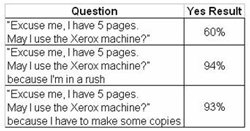
Top stories






More news


Marketing & Media
Ads are coming to AI. Does that really have to be such a bad thing?













It is not easy for the brand's story to gain a hearing. Ideally a new story needs to have enough familiar elements so that it is not instantly rejected, yet distinctive enough to engage the consumer. Howard Gardner, in his book Changing Minds, identifies seven key levers for a story to be consumed and believed - to effectively change peoples' minds1.
We like to think of ourselves as reasonable. The word itself conjures up respectability. Even though a reason for drought may be the absence of rain - we are somewhat programmed to react to any form of substantiation, even if there is no real meaning behind it. The following experiment by Ellen Langer illustrates this well:
A person asking to jump the queue at a photocopy machine2:

Men in white coats convince us that their soap powder is more effective, and blind taste tests prove a better experience 'without a doubt'. As consumers we place an enormous amount of faith in the 'proven'. Even the urban myth of 'it costs ten times more to convert a new customer than to keep an existing one' seem to persist for an educated audience who should realise that the converse is often true.
In a free market, we could be accused of our arguments being empty rhetoric. So we cite informal testimonials or formal research to make the message more credible. But, as consumers we know that we do not really possess the ability to distinguish the best cellphone company or DVD machine.
Instead we rely on how we feel about the brand, or rather - how we expect to feel - after making the commitment. Emotions are the lubricants of reason - the final decision is based on the symphony of stimuli that assault our senses.
A change of mind becomes convincing to the degree that it can be represented in a number of different forms. When Margaret Thatcher tried to convince Britain that the Labour Party was not working, her campaign poster was brilliant: It showed a long queue of men in a line outside an unemployment office with the headline "Labour isn't working."
Her own modest origins, bravery in the Falklands, personal stance against terrorism at the Brighton bombings and her ability to deal with political conflict, were all diverse representations of her central message. People got the message, whether they understood political mumbo jumbo or not.
The ability of the consumer to make a decision and the perceived benefits that follow are the levers that form part of every marketer's arsenal. Real world events and overcoming objections are also as common as interest rate fluctuations and the cynical consumer.
BP was an industrial giant until the oil embargo years beginning in 1973. The company fell on hard times, but in the early '90s things began to change. In the first quarter of 2001, BP reported a record-breaking profit of US$4.13 billion, some of which was partly due to extending beyond traditional production, such as solar generation, justly earning it the label of "beyond petroleum".
However, most astounding was the mental shifts within this giant company. People changed their minds.
Clear reasons for the change were backed up by research, resonance was promoted by ensuring the benefits of the new environment were felt (such as reinforcing the idea that it is better to work on problems with people you like and respect), representational rediscription was reinforced in spoken policy and behaviour, with adequate resources, taking account of real world events and developing more constructive arguments against resistant views1.
Every new story has a counterstory. Next time you visit your doctor with an ulcer, make sure his mind has changed. Otherwise, you know what to say.
1 Howard Gardner. Changing Minds. Harvard Business School Publishing, 2004.
2 Robert B Cialdini. Influence: the psychology of persuasion. Quill. William Morrow New York. 1993.
